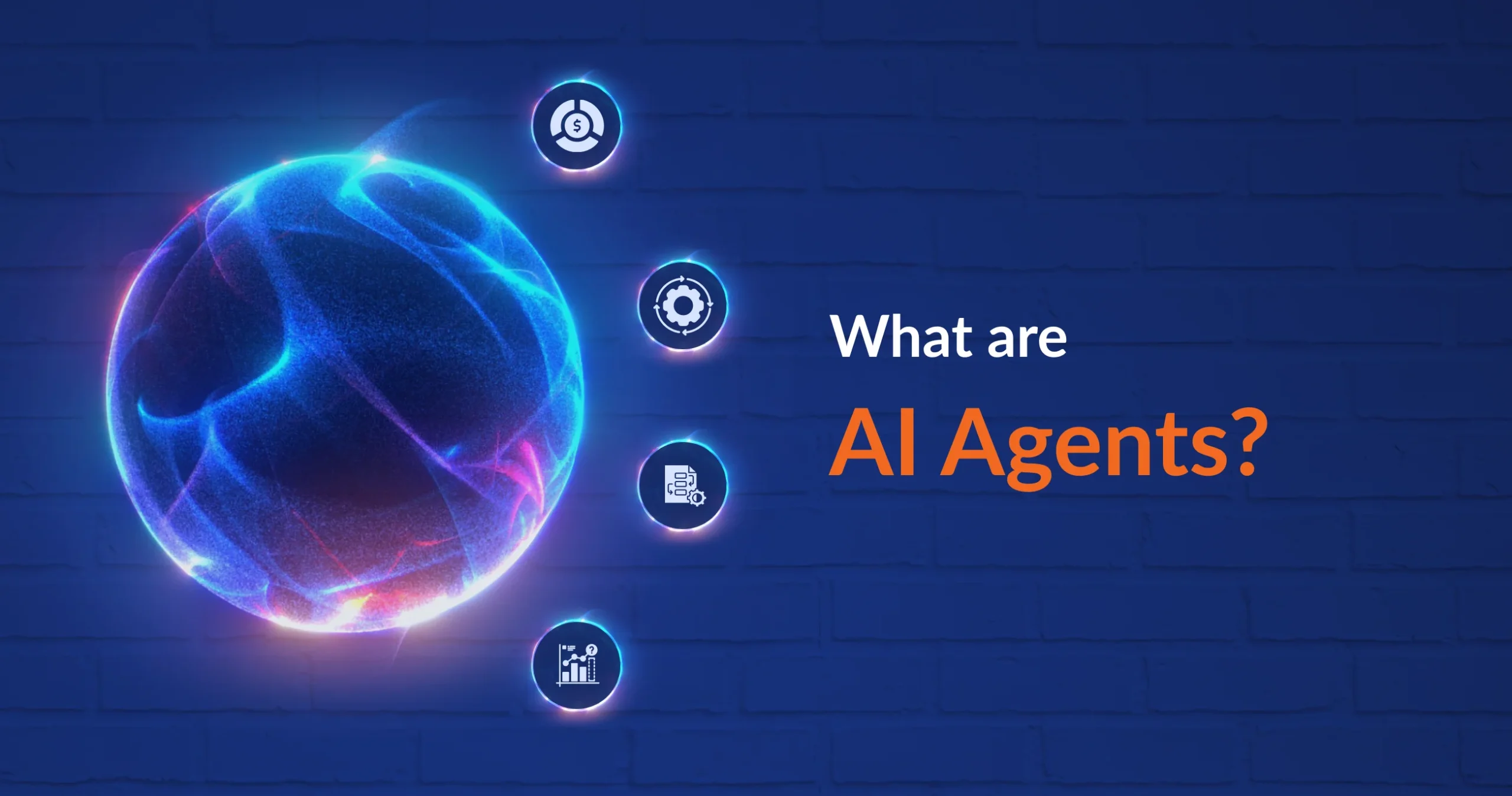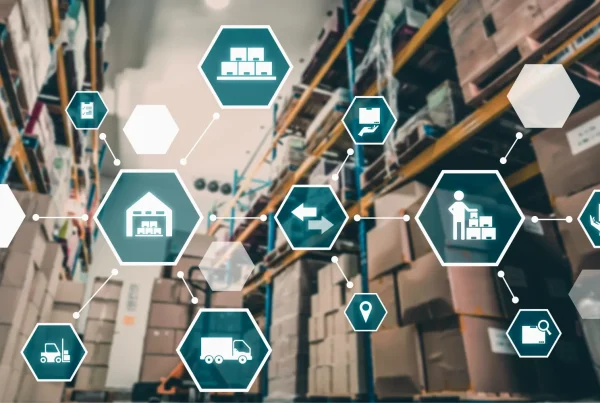AI Agents are transforming decision-making with real-time insights and automation. They don’t just process data—they learn, adapt, and take action instantly. This shift is helping businesses stay ahead by making faster, smarter decisions without human intervention. From pricing optimization to supply chain management, AI Agents are redefining how industries operate.
What sets AI Agents apart? How are they reshaping business strategies? This blog explores their key benefits, common use cases, and challenges. Learn how automation and data-driven decision-making can improve business outcomes and drive long-term success.
What Are AI Agents?
AI Agents are intelligent systems that operate autonomously. They analyze data, recognize patterns, and take action automatically. Unlike traditional software, AI Agents continuously learn and improve. Every new data point enhances their accuracy and efficiency.
These autonomous agents function as digital assistants. They handle specific tasks across multiple business areas. They automate pricing, inventory management, customer interactions, and supply chain operations. AI Agents go beyond automation. They work across systems, interpreting vast amounts of data to provide actionable insights.
The key strength of AI Agents is their ability to act instantly. Unlike human agents, they do not just detect issues—they solve them.
They have an internal model that helps them adapt and refine their strategies. An agent may autonomously adjust pricing, optimize inventory, or prevent fraud with a single conversation.
AI Agents track demand and ensure optimal stock levels. They predict sales trends and adjust inventory before shortages occur. They also optimize pricing by analyzing market conditions and competition.
They monitor accounts continuously and flag suspicious activity before it causes damage. AI Agents provide instant responses, process requests, and resolve inquiries efficiently. Their natural language processing capabilities make interactions smooth and human-like.
Unlike human-driven processes, AI Agents work 24/7 without fatigue. They minimize errors, improve response times, and ensure seamless operations. Businesses using AI Agents scale operations effortlessly, increase productivity, and reduce costs. These agents eliminate guesswork, allowing leaders to focus on strategy and growth.
AI Agents are shaping the future of business. They bring intelligence, automation, and precision to decision-making. As AI technology advances, these agents will become even more essential.
A Self-Learning Agent: More Than a Chatbot
The misconception that AI Agents are just chatbots is outdated. AI-powered agents go beyond simple customer interactions. They do this by addressing the root cause of business problems and solving them. They automate complex workflows, identify inefficiencies, and drive profitability.
Unlike traditional automation tools, AI Agents do not rely on static rules. Instead, they dynamically adapt to changing business conditions. They use predictive analytics and generative AI. This means AI Agents can:
- Analyze root causes rather than just flagging issues, with the next steps.
- Automate decision-making without human intervention.
- Reduce execution time with instant responses and zero manual errors.
- Optimize workflows by seamlessly integrating with existing business systems.
Self-learning AI Agents refine models using feedback and data. For instance, an AI-led Replenishment Agent improves forecasting with real-time insights. It tracks demand shifts, weather events, and geopolitical
risks. It adjusts inventory and reroutes shipments. It prevents stock shortages and lost sales. Operations become smoother and more efficient.
These learning agents handle complex tasks and work collaboratively. They communicate and coordinate across enterprise systems. Different AI Agents interact with other agents to ensure seamless integration. A pricing optimization agent works with an inventory agent. Together, they adjust availability and maximize revenue.
With self-learning capabilities, AI Agents automate decisions. They refine strategies to achieve specific goals. Businesses trust them to remove inefficiencies and drive growth. They ensure precision, efficiency, and better outcomes.
How Do AI Agents Work?
AI Agents operate on a structured framework. It enables smarter decision-making, and seamless automation, and enhances operational agility. The key components of AI Agents in retail include:
1. Knowledge Base & Memory
AI agents use fine-tuned Large Language Models (LLMs) to process vast datasets. These models help interpret business data. They understand user inputs and generate precise insights for decision-making.
2. Intent Recognition
Retail AI Agents analyze context and customer behavior to understand instructions. They process queries and identify intent instantly.
For example, a store manager may check stock availability. The AI Agent retrieves inventory data in real time. It then suggests immediate solutions and may recommend alternative product allocations. This ensures better inventory management and faster decision-making.
3. Action Execution
AI Agents go beyond insights—they take direct action. They adjust pricing, optimize replenishment, and automate promotions. They also streamline order processing. Retailers integrate these AI-driven workflows with enterprise software. This removes bottlenecks and speeds up execution.
4. Continuous Learning
AI Agents refine their decision-making process through iterative learning. They analyze past business outcomes and real-time performance metrics to adjust strategies. For instance, if a particular discount strategy increases conversion rates, AI Agents reinforce that approach in future campaigns.
5. Seamless System Integration
AI Agents integrate with ERP, CRM, and POS systems effortlessly. This ensures the seamless execution of AI-native decisions. They streamline supply chain management, enhance customer interactions, and improve financial reporting.
6. Real-Time Data Processing & Predictions
AI Agents process massive datasets in real time. They predict demand shifts, customer preferences, and inventory needs. Retailers act on these insights instantly.
This prevents overstocking and stockouts. It also helps maximize sales opportunities. AI Agents automate key processes, cutting manual inefficiencies. They reduce operational lag and boost efficiency. Retailers scale operations smoothly. In competitive markets, AI Agents ensure profitable growth.
Challenges of Using AI Agents
While AI Agents offer immense potential, businesses must address several challenges to maximize their effectiveness:
Integration Complexity
Retailers rely on legacy ERP, POS, and inventory systems that may not work well with AI. Smooth integration requires upgrades, investment, and effort. AI must sync with multiple platforms while maintaining workflows. Real-time data exchange is essential for seamless operations.
Data Security & Compliance
AI handles sensitive customer data, including purchases and payments. Strong encryption, authentication, and controlled access prevent breaches. Retailers must comply with regulations like GDPR and CCPA. Secure data usage builds customer trust and prevents legal risks.
Model Accuracy & Bias
AI relies on data for pricing, demand forecasts, and recommendations. Poor data quality and biased training models lead to errors. This impacts stock levels, pricing, and customer satisfaction. Continuous monitoring, real-time updates, and diverse data reduce inaccuracies.
High Implementation Costs
Deploying AI requires major investment in software, infrastructure, and talent. Ongoing maintenance, training, and upgrades add to costs. Smaller retailers may struggle without clear short-term returns. Long-term planning is crucial for ROI.
Transparency in AI Agents
AI agents must explain their decisions clearly. Black-box models make it hard to understand why an AI recommended a price change or product. Without transparency, retailers struggle with trust, compliance, and customer confidence. AI agents must provide interpretable insights to ensure accountability and adoption.
Use Cases of AI Agents
Goal-based agents are transforming industries with applications across various business functions:
Retail & E-commerce
Retailers use model-based agents to optimize pricing, forecasting, and replenishment. AI-powered agents analyze vast datasets, including sales trends, seasonality, and regional demand. They recommend the best inventory levels to prevent overstock and stockouts. This reduces waste and boosts revenue.
Additionally, AI Agents automate markdown pricing strategies. They adjust discounts dynamically based on real-time demand, competitor pricing, and customer behavior.
Supply Chain & Logistics
Advanced AI Agents improve forecasting, reduce disruptions, and streamline logistics. They predict shortages, adjust inventory, and reroute shipments to prevent delays.
These agents analyze weather, geopolitical risks, and transport costs. They optimize delivery routes and supplier contracts. Ensure smooth and cost-effective supply chain operations.
Finance & Analytics
Financial institutions use AI Agents for fraud detection, risk assessment, and reporting. They analyze transactions to spot suspicious activity and reduce fraud.
These agents assess financial performance in real time, identify cost-saving opportunities, and optimize cash flow. Automated reporting ensures accurate insights with minimal manual effort, improving decision-making and efficiency.
Customer Service
AI-powered virtual assistants manage high volumes of customer inquiries. They provide personalized responses, reducing wait times and improving satisfaction.
These agents go beyond simple Q&A. They understand context and emotions to deliver relevant solutions. AI Agents identify pain points and suggest improvements. Businesses stay ahead of changing consumer expectations. With AI Agents, businesses boost efficiency, increase profitability, and stay competitive.
Benefits of Using AI Agents
Scalability
AI Agents allow retailers to expand operations without increasing costs. They handle large datasets, automate tasks, and support business growth with minimal human intervention. Businesses can scale customer interactions, inventory management, and decision-making without adding an extra workforce. AI Agents work 24/7, ensuring real-time responsiveness to market changes. They enable businesses to expand into new markets while maintaining operational efficiency.
Efficiency
AI Agents streamline workflows by reducing manual processes. AI-driven automation ensures faster execution, freeing employees to focus on high-value tasks. Retailers can manage pricing, promotions, and stock allocation with minimal effort. AI-native insights ensure that business decisions are made quickly and accurately. By eliminating redundant processes, AI Agents improve overall business efficiency and productivity.
Error Reduction
AI Agents minimize human errors by relying on data-driven algorithms. They analyze vast data accurately, ensuring precise decision-making and reducing costly mistakes. AI eliminates errors in pricing, order fulfillment, and demand forecasting. Businesses can trust AI Agents to execute tasks with consistency and accuracy. Predictive analytics further reduce errors by identifying potential pitfalls before they occur.
Better Targeted Marketing
AI Agents analyze customer behavior and purchase patterns to deliver personalized promotions and recommendations. They segment customers based on demographics, interests, and buying habits. AI can predict which products customers are likely to buy and suggest tailored offers. Retailers can use AI-driven marketing campaigns to increase engagement and conversion rates. With AI, businesses can enhance customer relationships by offering relevant and timely promotions.
Cost Reduction
AI Agents optimize supply chain operations and inventory management to lower operational costs. They predict demand accurately, reducing overstock and stockouts. Automated processes decrease the need for manual labor, cutting operational expenses. AI-driven insights help businesses identify cost-saving opportunities in procurement, logistics, and workforce management. By minimizing inefficiencies, AI Agents contribute to long-term financial savings.
Waste Minimization
AI-native demand forecasting helps retailers stock the right products in the right quantities. This reduces excess inventory and minimizes waste. AI Agents can track expiration dates and suggest timely discounts to move perishable goods. Efficient inventory management prevents unsold stock from piling up. Businesses can achieve sustainability-based specific goals by reducing waste and optimizing resource utilization.
Task Automation
AI Agents automate repetitive tasks. This includes order processing, price adjustments, and customer queries. They handle time-consuming activities, allowing employees to focus on strategic planning. AI chatbots provide instant responses to customer inquiries, improving service quality. Automated systems ensure timely price updates, restocking, and performance analysis. By automating routine processes, AI Agents enhance operational speed and accuracy.
With AI Agents managing critical tasks, organizations improve accuracy. They enhance decision-making, boost agility, and drive long-term growth.
Take the Next Step and Deploy Impact Analytics Artificial Intelligence Agents
Impact Analytics AI Agents supercharge operations with smarter decisions. They optimize pricing, streamline supply chains, and automate workflows. These AI-native solutions enhance efficiency and reduce inefficiencies. They help businesses stay agile, scalable, and competitive.
Ready to make smarter, faster decisions with AI? See how Impact Analytics AI Agents can help you stay ahead today!
Frequently Asked Questions
What are AI Agents?
AI Agents are intelligent systems that learn and act autonomously. They analyze data, recognize patterns, and take action instantly.
How do AI Agents help retailers?
AI Agents optimize pricing, manage inventory, predict demand, and automate workflows. They reduce errors and improve operational efficiency.
Do AI Agents replace human workers?
AI Agents automate tasks, but they complement human roles. They enhance decision-making, reduce errors, and allow employees to focus on strategy.
Are AI Agents secure?
AI Agents follow strict data security protocols, including encryption and compliance with regulations like GDPR. They protect sensitive customer data effectively.





